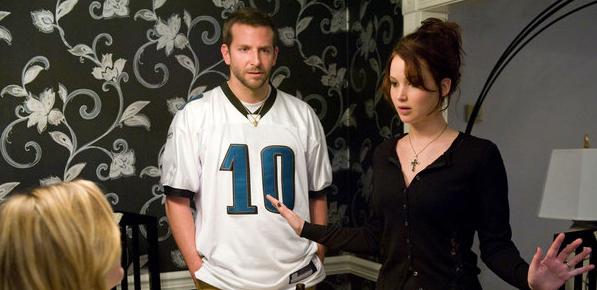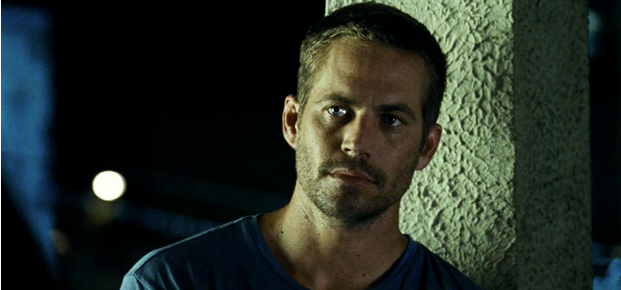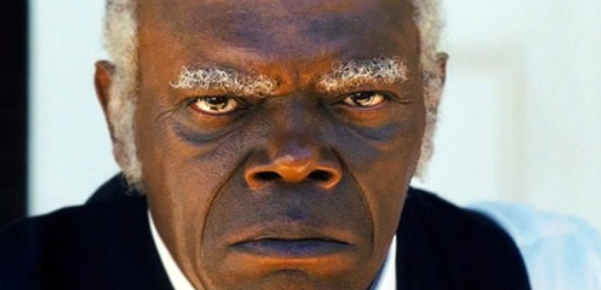Silver Linings Playbook (David O. Russell, director). Two zanies meet cute, overcome a boatload of wacky complications to find love. The setup sounds like a plot spun from the delicious mind of a Preston Sturges or Howard Hawks. Russell, returning to the brand of comedy he minted in such films as Spanking the Monkey and Flirting with Disaster, supplies enough lunacy in Playbook to fuel another golden age of film hijinks. That the comedy is tempered a genuine core of pain is the film’s genius; rivulets of disappointment, fear, anger and suspicion ooze from its characters, eliciting a discomfort that throws the audience off-balance. Sometimes you want to look away, but do so at your peril. The film taps into the insecurity in all of us: that sense that behind our facades we’re all teetering on the edge, struggling to get life right. Playbook has a killer ensemble of actors headed by Bradley Cooper, Jennifer Lawrence and a newly minted DeNiro in a performance that banishes the memory of his recent Saturday Night Live appearance. Nominations: 8.
Les Miserables (Tom Hooper, director). One of the 80s biggest mega-musicals finally makes it to the big screen, in the year’s biggest disappointment. The pleasure of seeing it live lay not in its book, or hyper-bombastic score, but in Trevor Nunn’s original staging (I can still see those circles of faux-French citizens marching in step as the Act I curtain rang down). A cinematic equivalent of Nunn’s ingenuity eludes Hooper, a foursquare director if there ever was one. The motiveless malignity of Javert’s pursuit of Jean Valjean remains as unconvincing as it was on Broadway; ditto the comic appeal of Sacha Baron Cohen and Helena Bonham Carter as the jokily evil Thenardiers (see previous blog on rustics). Not enough grit, too much Hallmark, despite some valiant trouping by Hugh Jackman, Samantha Barks, Eddie Redmayne, and especially, Anne Hathaway, who’ll no doubt win an Oscar for sustaining the film’s sole moving moment. Nominations: 8, including, improbably, Best Picture.
Lincoln (Steven Spielberg, director). If 90% of a project’s success lies in its casting, then you could surmise it was enough for Spielberg to place his camera, yell “action,” and turn his actors loose. It’s hard to imagine a better 16th President than Daniel Day-Lewis, brimming with equal measures of warmth, gravitas and humor; he’s matched by Sally Field—stern, vulnerable, a mournful wraith in black crinoline who teeters between common sense and impending insanity. This is a film painted with faces, a Who’s Who of American character actors deployed with stunning effect in roles large and small; the great playwright Tony Kushner has given them a feast of words to rival Shakespeare’s for argument and eloquence. Just when you think you’re tired of Spielberg (my own excitement waned a touch after Minority Report) he up and delivers a masterpiece. Nominations: 12
Argo (Ben Affleck, director). Not nominating him as Best Director has already proved a historic mistake, especially after his work on Gone, Baby, Gone and The Town. It’s hard to think of someone except, perhaps, Steven Soderbergh, who could coalesce Argo’s disparate elements. This true story (a U.S. government agent must extract six Americans taking refuge in the Canadian embassy in Tehran during the 1979 hostage crisis) is about three movies packed into one: an espionage thriller brimming with CIA intrigue; a classic innocents-in-jeopardy melodrama, and last, a farcical depiction of Hollywood capriciousness. In look and tone, Argo bears not a whit of resemble to Affleck’s previous work, but he doesn’t so much as break a sweat. But you will: hang on for all the twists and turns, and a will-they-or-won’t-they climax that will have you clawing your armrest. Nominations: 7



